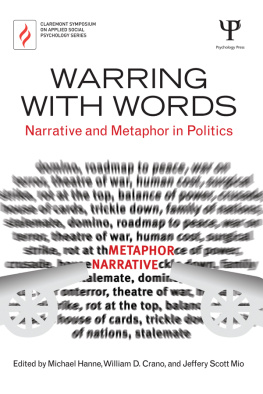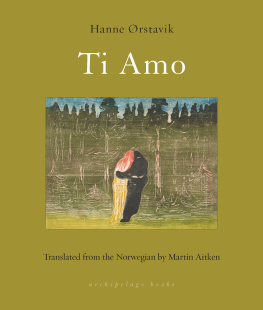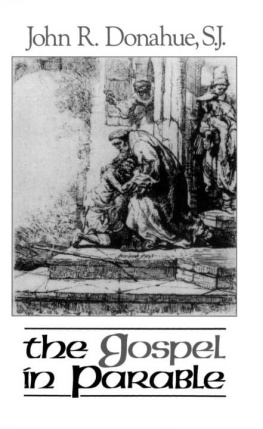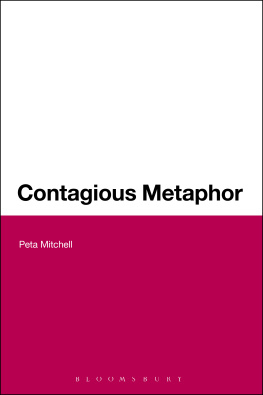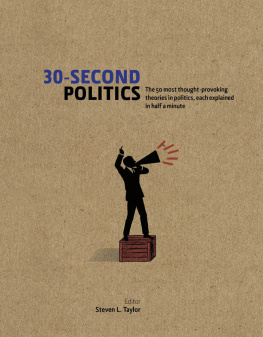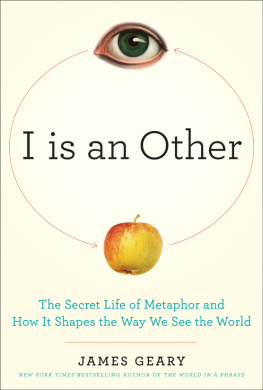Warring with Words
Scholars in many of the disciplines surrounding politics explicitly utilize either a narrative perspective or a metaphor perspective (though rarely the two in combination) to analyze issuestheoretical and practical, domestic and internationalin the broad field of politics. Among the topics they have studied are:
- competing metaphors for the state or nation which have been coined over the centuries in diverse cultures;
- the frequency with which communal and international conflicts are generated, at least in part, by the clashing religious and historical narratives held by opposing groups;
- the cognitive short-cuts employing metaphor by which citizens make sense of politics;
- the need for political candidates to project a convincing self-narrative;
- the extent to which the metaphors used to formulate social issues determine the policies which will be developed to resolve them;
- the failure of narratives around the security of the nation to take account of the individual experiences of women and children.
This volume is the first in which eminent scholars from disciplines as diverse as social psychology, anthropology, political theory, international relations, feminist political science, and media studies, have sought to integrate the narrative and the metaphor perspectives on politics.
It will appeal to any scholar interested in the many ways in which narrative and metaphor function in combination as cognitive and rhetorical instruments in discourse around politics.
Michael Hanne is Associate Professor of Comparative Literature at the University of Auckland, New Zealand. His research interests include literature of cross-cultural encounter, narrative, and metaphor across the disciplines, folk-tales, and reworking stories. In 2010, he convened a symposium at the University of California, Berkeley, entitled Binocular Vision: Narrative and Metaphor in Medicine. The papers from which he edited for a special issue (volume 44, issue 3) of the journal Genre: Forms of Discourse and Culture in 2011.
William D. Crano is a Professor of Psychology at Claremont Graduate University. His basic research is concerned with social influence, especially the impact of minorities on the beliefs and actions of the majority, and on the effects of self-interest on attitudes and actions. His applied research is concerned with the development of persuasive and instructional information to prevent the spread of HIV/AIDS, and to prevent drug abuse, in children and adolescents. He is a fellow of the APA and APS, has been a NATO Senior Scientist, a Fulbright Fellow to Brazil, and a liaison scientist in the behavioral sciences for the Office of Naval Research, London. He also has served as the Chair of the Executive Committee for the Society of Experimental Social Psychology, and as Director of the Program in Social Psychology at NSF.
Jeffery Scott Mio is Professor in the Psychology and Sociology Department at California State Polytechnic University, having earned his PhD in clinical psychology at the University of Illinois in 1984. He specializes in three lines of research: metaphors, and their use in political persuasion; multicultural issues; and how to develop allies. He teaches multicultural issues at both the undergraduate and graduate levels in addition to social psychology, cognitive psychology, and psychopathology. Mio has published numerous articles and books and has received an Emmy award for his role as a consultant in a public television educational series.
First published 2014
by Psychology Press
711 Third Avenue, New York, NY 10017
and by Psychology Press
27 Church Road, Hove, East Sussex BN3 2FA
Psychology Press is an imprint of the Taylor & Francis Group, an informa business
2014 Taylor & Francis
The right of Michael Hanne, William D. Crano, and Jeffrey S. Mio to be identified as editors of this work has been asserted by them in accordance with sections 77 and 78 of the Copyright, Designs and Patents Act 1988.
All rights reserved. No part of this book may be reprinted or reproduced or utilised in any form or by any electronic, mechanical, or other means, now known or hereafter invented, including photocopying and recording, or in any information storage or retrieval system, without permission in writing from the publishers.
Trademark notice: Product or corporate names may be trademarks or registered trademarks, and are used only for identification and explanation without intent to infringe.
Library of Congress Cataloging-in-Publication Data
Warring with Words: Narrative and Metaphor in Politics / edited by
Michael Hanne, William D. Crano, and Jeffrey S. Mio.
pages cm
1. Politics. 2. Metaphor. 3. Social Psychology. I. Hanne,
Michael. II. Crano, William D. III. Mio, Jeffrey S.
BF575.P9N482014
155.92dc23
2012048031
ISBN: 978-1-84872-567-6 (hbk)
ISBN: 978-1-84872-568-3 (pbk)
ISBN: 978-1-315-77601-9 (ebk)
Typeset in Times
by Apex CoVantage, LLC
Contents
WILLIAM D. CRANO
MICHAEL HANNE
PHILLIP L. HAMMACK
MICHAEL SINDING
CHIARA BOTTICI
ANNICK T. R. WIBBEN
MICHAEL HANNE AND MARK DANNER
MICHAEL P. MARKS
SUSAN WRIGHT AND CRIS SHORE
9 Nation Building Through Historical Narratives in Pre-Independence India: Gandhi, Nehru, Savarkar, and Golwalkar as Entrepreneurs of Identity
JAMES H. LIU AND SAMMYH S. KHAN
JEFFERY SCOTT MIO
LORI D. BOUGHER
WILLIAM D. CRANO
Chiara Bottici , The New School for Social Research, USA
Lori D. Bougher , Princeton University, USA
William D. Crano , Claremont Graduate University, USA
Mark Danner , University of California at Berkeley, USA
Michael Hanne , University of Auckland, New Zealand
Phillip L. Hammack , University of California at Santa Cruz, USA
Sammyh S. Khan , University of Exeter, UK
James H. Liu , Victoria University of Wellington, New Zealand
Michael P. Marks , Stanford University, USA
Jeffery Scott Mio , California State Polytechnic University, Pomona, USA
Cris Shore , University of Auckland, New Zealand
Michael Sinding , Vrije Universiteit, Amsterdam
Annick T. R. Wibben , University of San Francisco, USA
Susan Wright , Aarhus University, Denmark
William D. Crano
When Michael Hanne, Jeff Mio, and I began planning this conference, we singly and in concert recognized the generative potential of a symposium devoted to the topic of narrative and metaphor in politics. This symposium, owing to the subject matter chosen for Claremonts Symposium on Applied Social Psychology, brought together leading intellectuals from a host of allied but distinct and independent disciplines, whose insights, understanding, and wit promised, as Horace would have it, to inform and to delight. I am happy to be able to report that the consensus of those who attended the meeting and read various chapters we have collected here was that the authors of this volume took full advantage of the opportunity. Their presentations are not just instructive, but without exception of impressive quality. Perhaps even more remarkable, the various and diverse presentations seemed to speak each to the others, to add depth and value to the other authors views and visions. Although far from reaching paradigmatic agreement on the modes and means of understanding the forces at play in narrative and metaphor in political behavior, the creative possibilities sparked by the authors presentations are more than impressive, especially given the diversity of their disciplines and consequent worldviews (Kuhn, 1996). Despite the range of views they expressed, their distinct visions and axiomatic presuppositions, the speakers clearly breached disciplinary boundaries, creating dialogues that both enlightened and excited. There was very little evidence of Kuhns (1996) incommensurability in this varied group, and if you ever are in need of a good example of inter- or transdisciplinary scholarship, this conference in its totality provides all that is needed. In honesty, the editorsMike Hanne, Jeff Mio, and Icannot take credit for much of this, other than to claim, with no small degree of pride, that it is we who organized this meeting in the first place.

